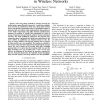Free Online Productivity Tools
i2Speak
i2Symbol
i2OCR
iTex2Img
iWeb2Print
iWeb2Shot
i2Type
iPdf2Split
iPdf2Merge
i2Bopomofo
i2Arabic
i2Style
i2Image
i2PDF
iLatex2Rtf
Sci2ools
CORR
2006
Springer
2006
Springer
Energy Efficiency and Delay Quality-of-Service in Wireless Networks
The energy-delay tradeoffs in wireless networks are studied using a game-theoretic framework. A multi-class multipleaccess network is considered in which users choose their transmit powers, and possibly transmission rates, in a distributed manner to maximize their own utilities while satisfying their delay quality-ofservice (QoS) requirements. The utility function considered here measures the number of reliable bits transmitted per Joule of energy consumed and is particularly useful for energy-constrained networks. The Nash equilibrium solution for the proposed noncooperative game is presented and closed-form expressions for the users' utilities at equilibrium are obtained. Based on this, the losses in energy efficiency and network capacity due to presence of delay-sensitive users are quantified. The analysis is extended to the scenario where the QoS requirements include both the average source rate and a bound on the average total delay (including queuing delay). It is shown that...
Average Total Delay | CORR 2006 | Education | Energy Efficiency | Multi-class Multipleaccess Network |
| Added | 11 Dec 2010 |
| Updated | 11 Dec 2010 |
| Type | Journal |
| Year | 2006 |
| Where | CORR |
| Authors | Farhad Meshkati, H. Vincent Poor, Stuart C. Schwartz, Radu V. Balan |
Comments (0)

